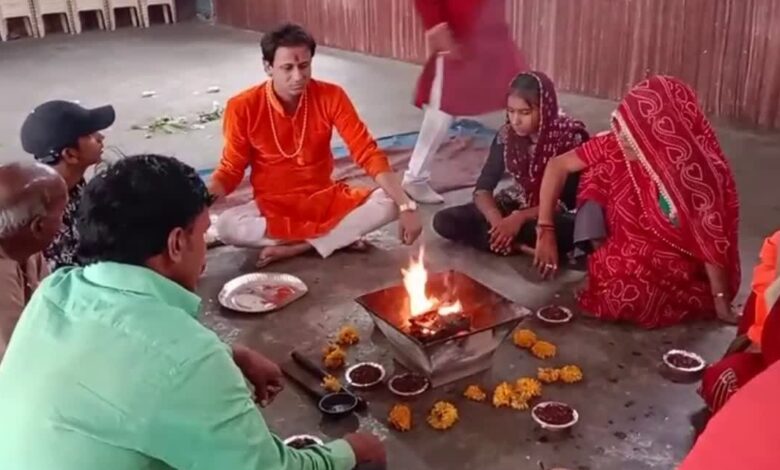Madhya Pradesh Ghar Wapsi: Eight Muslims Embrace Sanatan Dharma Amidst Controversy

News Mania desk/Agnibeena Ghosh/7th May 2024
Eight Muslims, including three women, underwent a spiritual transformation by embracing Sanatan Dharma through Hindu rituals at the Khajrana Ganesh temple on April 27. This significant event, commonly referred to as Ghar Wapsi, took place under the security cover of Vishwa Hindu Parishad (VHP) volunteers. Indore Vibhag organisational secretary Abhishek Udenia confirmed that the individuals, hailing from Mandsaur and Khajrana of Indore, participated in the religious ceremony to adopt Sanatan Dharma.
The ritual at the Khajrana Ganesh temple involved performing Hawan and Arti, followed by seeking blessings from Lord Ganesh. As part of their spiritual journey, the participants underwent a change in their names to reflect their newfound faith. For instance, Haider from Khajrana was renamed Harinarayan, while Gaffar from Mandsaur became Govind, and Mohammad Yunus adopted the name Mohanlal. Additionally, their family members also received new names, symbolizing their collective transition to Sanatan Dharma.
Before their initiation into Sanatan Dharma, the participants underwent a purification process, which included bathing in cow urine and other purifying essentials. Once purified, they were adorned in saffron attire and escorted to the Khajrana temple by priests from the Patidar community Dharamshala. Expressing his newfound affinity for Sanatan Dharma, Harinarayan shared that he had been influenced by its teachings for several years.
However, the conversion stirred controversy, especially amidst the ongoing General Elections, prompting concerns about communal tensions. Haider, now known as Hari Narayan, described his spiritual journey as a rebirth, highlighting the significance of his decision to embrace Sanatan Dharma. Unfortunately, the transition was met with hostility, as unidentified assailants attacked Hari’s residence on May 2, shortly after his conversion.
Accusing members of the Muslim community of perpetrating the attack, Hari condemned their actions and revealed receiving death threats, compelling him to seek police intervention. Despite expressing his willingness to file a complaint, Hari’s fear of reprisal prevented him from visiting the police station. In response, the Indore Deputy Commissioner of Police assured Hari of police protection and urged him to file an FIR.
In his complaint letter to the police, Hari appealed for security measures against potential threats from individuals associated with the Muslim community. Additionally, Hari formalized his allegiance to Sanatan Dharma by submitting a notarized document to the magistrate, as per the provisions of the Madhya Pradesh Freedom of Religion Act.
The incident underscores the complexities surrounding religious conversions and communal tensions in India. While individuals have the right to freedom of religion, the process of Ghar Wapsi often sparks controversies and animosities, particularly in politically charged environments. The attack on Hari’s residence highlights the need for effective law enforcement measures to safeguard individuals exercising their religious freedoms and to prevent communal violence.






